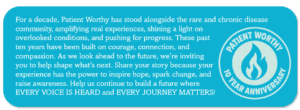Go here to read Part 1, Part 2, Part 3, and Part 4 of this series provided by TREND Community about Prader-Willi Syndrome.
On March 5, 2025, TREND Community released its latest quarterly report on Prader-Willi Syndrome (PWS), delivering fresh insights into the challenges, needs, and resilience of those affected by this rare genetic disorder. The “Gastrointestinal Issues in the PWS Community” draws from ongoing community engagement, capturing the voices of patients, caregivers, and advocates to highlight emerging patterns and persistent issues within the PWS landscape.
Prader-Willi Syndrome is most often recognized for its hallmark symptom of insatiable hunger (hyperphagia), but the Q4 report makes clear that the syndrome’s impact is much broader. Through a combination of data analysis, caregiver stories, and direct testimonials, the report reveals the daily realities for families: constant supervision to prevent food-seeking behavior, emotional and mental health struggles, and the ongoing search for effective support.
A major focus of the report is the evolving needs of individuals with PWS as they age. Caregivers describe how symptoms change over time, with new behavioral challenges and medical complications emerging in adolescence and adulthood. The transition from pediatric to adult care is identified as a critical stress point, with many families reporting difficulties in finding knowledgeable providers and appropriate support services.
Behavioral issues such as anxiety, rigidity, and sudden outbursts, remain a top concern. The report notes that these behaviors can be as disruptive and distressing as hyperphagia itself and often require just as much attention and management. Families emphasize the importance of tailored behavioral interventions and the value of connecting with other caregivers who understand the unique challenges that PWS presents.
Access to specialized medical care continues to be a struggle. Many respondents share stories of clinicians unfamiliar with PWS, leading to misdiagnosis or inadequate treatment. The report calls for increased education and awareness among healthcare providers to ensure better outcomes for PWS patients at all stages of life.
Despite these challenges, the Q4 report is also filled with examples of resilience and community strength. Families report that peer support networks, online groups, and advocacy organizations provide crucial information and emotional backing. Many caregivers share their own tips for managing daily life with PWS, from establishing structured routines to creating safe environments and advocating for educational accommodations.
The TREND Community underscores the importance of patient and caregiver voices in guiding future research, clinical practice, and policy. The Q4 report concludes with a call to action: to deepen collaboration between families, healthcare professionals, and researchers in order to develop more comprehensive care pathways and innovative therapies.







